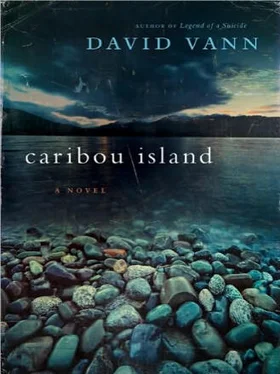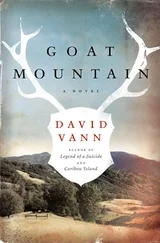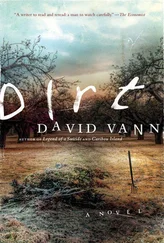Carl looked at the net passing beside them, and he didn’t see anything.
No luck yet today, Mark yelled.
At the other end of the net, Mark used a pole to grab the yellow buoy line out of the water. He pulled in fast, clipped the tow line onto the net, unclipped the buoy, and Dora shifted into gear again, pulled at the net slowly, straightening.
Carl clung to the doorjamb and thought of all the ways to lose a hand on this boat, caught in any of the lines under pressure, everything wet and slippery and moving, and today was a nice day, big rollers from a faraway storm but no wind. He couldn’t imagine doing this when it was rough, but he knew Mark and Dora went out regardless of the weather. Dora’s permit allowed only certain days for fishing, usually Mondays and Thursdays.
Dora pulled for another fifteen minutes at the net, then shifted into neutral and yelled for Mark to bring it in. Mark stood at the stern with his foot on a board that was tied to a hydraulic lever. A homemade contraption, something rigged to make the work faster. When he stepped on it, the reel pulled in, net and buoys coming over the aluminum stern guide, a rounded plate with two posts. Dora stood on the other side of the net, and the two of them pushed and pulled to guide it evenly onto the reel.
Carl watching for fish, feeling he could understand why someone would spend a life out here. It wasn’t the money, or despair. It was mystery. Wondering what was down there, what was in that net. They might have nothing or they might have hundreds of salmon. Or they could have anything else large that lives in the sea. You could believe in monsters if you had a big enough net. The ocean an immensity, but they were capturing a small part of it.
Mark kept his foot on the board, the drum pulling tight. Carl wondered whether the boat could buck from the pressure. The netting pulled free of the water, dripping, wrapping onto the reel. This seemed the point at which everything could break, the lines snapping or the drum crumpling. Carl stepped away from the door, grabbed onto what he could and got to the side of the boat. He didn’t want to be in a direct line if something snapped and whipped back. The worst pressure came when the stern of the boat was lifted on a wave. The strain then was incredible.
Feels light, Mark yelled to Dora, but to Carl it felt as if the boat was about to break, as if it had a spine that could curl and finally snap.
A single salmon came over the top with the net, and Mark let his foot off the board. He grabbed the fish fast, yanked it out of the net in one quick downward motion.
Then empty net again, long winds of the reel with nothing, only a few bits of seaweed, like small brown sea bouquets, and finally one more salmon, silvery and narrow-faced, dark back, thrown onto the deck in obvious disappointment.
Skunked, Mark said to Dora, and Carl realized everything rode on Mark. If there were no fish, it was his fault. A day spent on the water was money spent, on diesel and the license and the cost of the boat, and the net could be put out only so many times.
Mark wound the rest of the net, until the buoy came over the top and he unclipped. Dora climbed the flybridge and put the engine in gear again, heading out to other water.
Carl made his way back to the door. Sorry about that, he yelled to Mark. That sucks.
Mark didn’t respond. Still sorting on the aft deck, framed now by a white wake. He scooped a salmon by the gills, flicked his finger inside, which made a popping sound, then tossed the fish into a side bin. He did the same to the other salmon and grabbed a hose to wash down the deck. Then he came forward, and he didn’t look unhappy.
No worries, mate, he said to Carl. You feel like helping me find the fish?
Sure, Carl said. He had no idea what that meant.
Come up top, Mark said, and Carl climbed the ladder after him. Dora gave a mock salute and went below.
Carl took the wheel and Mark sat beside him on the bench seat, pointing the direction to steer. Toward the boats way over there, he said.
What was that popping sound? Carl asked.
What?
When you grabbed the gills, some popping sound.
Oh yeah, just popping the gills so the fish bleed out. Easiest way to kill them, and with all the blood gone, they go into the slush much cleaner. We get a higher price if we do that.
Then Mark was talking on the radio, just chatting with his friends out here, other fishermen, asking how they were doing, making plans to hang out, inviting to the sauna. He seemed relaxed and casual for someone who hadn’t caught any fish today. Occasionally he’d use the binoculars.
Steering the Slippery Jay was like steering a bicycle with loose handlebars. Carl would turn one direction and feel the boat still going the other way. Then it would come back too far. He was all over the place, embarrassing, but Mark didn’t seem annoyed. Still chatting with his friends.
Then Mark pointed to the left. He put down the mic for the radio. Over there, he said. Change of direction. The two white boats right there.
The ones in closer? Carl asked. He turned the wheel.
Yeah.
Is that where the fish are?
Yeah. They’re killing fish right there, right now.
One of your friends told you this?
Yeah.
But I didn’t hear anything.
It was the conversation about beer. No code words or anything, just a feeling about what’s being said. We don’t want anyone else to know. Then every boat in the area would be moving over here.
Wow, Carl said.
Yeah, it’s very James Bond out here, Mark laughed. He was using the binoculars again, looking at the group of boats they had been heading toward before. A couple of them are coming over. They figured it out, too. Maybe just waiting to see us turn. We’ll have to get the net in the water fast.
Carl looked back for a moment but couldn’t see anything at this distance. The whole business felt urgent now. Do you know them? he asked Mark.
Russian boats, Mark said. Bigger, forty-two feet, running a double D, two licenses, so they get an extra shackle, twelve hundred feet on their net.
Russians?
Alaskans now, I guess, Mark said. But Russian. Two communities here, one near Ninilchik. Good fishermen, so they don’t usually need us. Must be having a slow day. They usually keep to themselves, very closed communities, all family, all fishermen and boat builders, highest fishermen per capita for any population here.
So they’re the best?
Mark laughed. The Norwegians are the fish-killing sons of bitches. Out on the other side of the inlet. Towns you can get to only by float plane or boat. They bred the cows and killed the bulls.
What?
Sorry, Mark said. It’s really rude and politically incorrect. Just a saying here. The Norwegians bred all the Aleut women and killed most of the men, so in those towns, everyone has a Norwegian last name, Knudsen and such. Almost no Aleut surnames. I worked in one of them one summer, as a carpenter, and they are serious fish-killers. Have it from both sides. And they follow their own laws.
What’s that mean? Carl asked. The boat seemed terribly slow. Wallowing through the waves, nothing passing quickly. Meanwhile, the Russians were gaining on them, he knew. He could see the appeal of those fast aluminum boats with their gasoline engines.
There was a kid, Mark said, a teenager, who was angry about something — and there’s plenty to be angry about in a village, I’m sure, incest and such, who knows what goes on — so he stole from his aunt, nothing much, but then he stole someone’s four-wheeler and took it down the beach and finally drove it into the water. He ditched it below the low-water mark. But of course no one was fooled. They took him into the center of the village and put a fish sack over him, then all the men came at him with fish bats. His own father clocked him right in the head. I’m standing there wondering if I’m seeing a murder, and I think I did. I never asked about it. I was just there to help build a house. That was it.
Читать дальше












